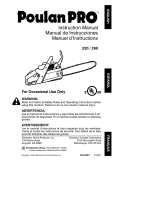
YOUR WARRANTY RIGHTS AND OB*
LIGATIONS: The U. S. Envirortmerrtal
Protection Agency, Envirorrrnerrt Canada
and ELECTROLUX HOME PRODUCTS,
INC., are pleased to explain the emissions
corltrel system warranty on your year
2002-2004 small off-mad engirre. ELEC=
TROLUX HOME PRODUCTS, INC., must
warrant tha emission control system enyour
small off-road engine for the period's of time
listed below provided there has been no
abuse, rregleu't,or improper rnaintenarlce of
your small off-road engine. Your emission
control system includes parts such as the
carburetor and the ignition sy_temr Where a
warrantable condition exists, ELECTRO=
LUX HOME PRODUCTS, INC., will repair
your small off-mad engine at no cost to you.
Expens_ _'ovorod under warrar_ty include
diagnosis, parts and labor. MANUFACTUR-
ERS WARRANTY COVERAGE: If any
emissions _lated part on your engine (as
listed under Emissions Control Warranty
Parts List) is defective or a defect irt thema-
terials erworkmarrship of the engine Causes
the failure of such an ernissiort related part,
the part will be repaired or replaced by
ELECTROLUX HOME PRODUCTS, INC.
OWNER'S WARRANTY RESPONSIBILE
TIES: As_he small off-read engine eJvrrer,
you are responsible for tha performance of
the required maintenance listed lrl your in-
struction manual. ELECTROLUX HOME
PRODUCTS, INC., recommends th_ you
retain all receipts _'ovoring maJntenartce On
your small off-road engine, but ELECTRO=
LUX HOME PRODUCTS, INC., cannot
deny warranty solely for the lack of receipts
or for your failure to ensure theperforrrrsnco
of all scheduled mairtterrsnce. AS the small
off-read engine owner, you should be aware
that ELECTROLUX HOME PRODUCTS,
INC., rrrsy deny you warranty coverage if
your small off-read engine or a part of it has
failed duo to abuse, neglect, irnproper main-
terrsnce, urrspproved modific_tiorrs, or the
use of parts riot made or approved by the
ofigirrsl equipment manufacturer. YOU are
responsible for presenting your small off-
road engine to an ELECTROLUX HOME
PRODUCTS, INC., authodzed repair center
as s_n as a problem exists. Warranty re-
pairs should be _'ompleted in a roasorrsble
amount oftime, not to exceed 30 days. Ifyou
have any questions regarding yeurwarranty
rights and responsibilities, you should con-
tact your nearest authorized sowice center
or c.311ELECT ROLUX HOME PRODUCTS,
INC., _ 1-800-554-6723. WARRANTY
COMMENCEMENT DATE: The warranty
peded begins err the date the small off-read
engine is purchased. LENGTH OF COVER-
A_E: This warranty shall be for a peded of
bye years from the initial date of purchase.
WHAT IS COVERED: REPAIR OR RE-
PLACEMENT OF PARTS. Repair or ro-
_olaCement of any warranted part will be per-
rmed at no charge to tha owrrer at an
appreved ELECTROLUX HOME PROD-
UCTS, INC,, sawicing cerlter. If you have
arty questions regarding your warranty
rights and responsibilities, you should con-
_tu_tyour nearestauthorized service eorrter
or call ELECTROLUX HOME PRODUCTS,
INC., at 1-800-554-6723. WARRANTY
PE ,OO2A,,ywor ar,t d,artwhichisr,ot
scheduled for replacement as required
maintenance, or which is scheduled only for
r_._ular inspection to the effect of "repair or
replace as necessary" shall be warranted for
2 years. Any warranted part which is sched=
ulcd for replacomerrt as required mairlte-
hence shall be warranted for the peded of
time up to tile first scheduled replacement
point for that part. DIAGNOSIS: The Owner
shall not be cha_cd for diagnostic labor
which loads to thedetemlinatiort that a war-
r,mtod pa_ is defective if the diagnoxstic work
isperfemled at arl apprew.,d ELECTROLUX
HOME PRODUCTS, INC., sarvicing center.
CONSEQUENTIAL DAMAGES: ELEC-
TROLUX HOME PRODUCTS, INC,, may
be liable for damages to other engine com-
ponerlts caused b_;the failure of a_'arrantcd
part still under warranty. WHAT 18 NOT
COVERED: All failures caused by abuse,
neglect, or irnproper maintenar_ are not
covered. ADD-ON OR MODIFIED PARTS:
The use of add-on or modified parts cart be
greunds for disallowing a warranty claim.
ELECTROLUX HOME PRODUCTS, INC.,
is riot liable to _'ovor failures of warranted
_arts caused by the use of add -on or modi-
cd parts. HOW TO FILE A CLAIM: If you
have arty questions r_arding your warrarrty
rights and responsibilities, you should con-
_tu't your nearest authorized service _brrter
or call ELECTROLUX HOME PRODUCTS,
INC., at 1-800-554-6723. WHERE TOGET
WARRANTY SERVICE: Warranty services
or repairs shall beprevided at all ELECTRO-
LUX HOME PRODUCTS, INC., service
corrters. Call 1-800-554-6723. MAINTE-
NANCE= REPLACEMENT AND REPAIR
OF EMISSION RELATED PARTS: Any
ELECTROLUX HOME PRODUCTS, INC.,
approved roplacornerrt part used in the per-
formance of any warranty maintenar_: or
repair on emission related parts will be pro-
vided without c[rs_e to the owner ifthe part
is under warranty. EMISSION CONTROL
WARRANTY PARTS LIST: Carburetor,
Igrlfiiorl System: SparkPlug (covered up to
maintenance schedule), Ignition Mo_ula.
MAINTENANCE STATEMENT: The owner
is responsible for the performance of all re-
quired rnairrterrsnce as defincd in the irl-
struction manual.
17




















